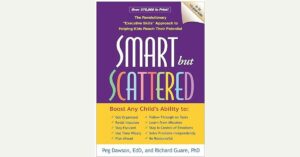The Book: “Smart but Scattered Teens” (affiliate link)
Authors: Richard Guare, PhD, Peg Dawson, EdD and Colin Guare, MS

What is it about?
“Smart but Scattered Teens” (affiliate link) is all about helping your teenager improve their executive function skills. What are executive function skills? The authors define them as “brain-based skills required for humans to effectively execute, or perform, tasks and problems.” Children with autism and ADHD usually have a lack of executive function skills due to their development and need help with improving these skills.
Executive function skills include:
- Response inhibition
- Working memory
- Emotional Control
- Flexibility
- Sustained attention
- Task initiation
- Planning/prioritization
- Organization
- Time management
- Goal-directed persistence
- Metacognition (ability to observe yourself as third person and self-monitoring)
The authors have worked with children and adolescents for decades, and they have a great deal of experience in helping teens learn and improve executive functioning. In this book, they provide an overview of the executive function skills and encourage you to assess your teen’s current abilities as well as your own. They also discuss parenting styles and the strengths and weaknesses of each when it comes to helping teens with their executive function skills.
Then, the authors break down each skill and provide scenarios and practical guidance for how to best help your teen improve that skill. This is definitely a book to read but then also keep and go back to as a reference and for advice over and over.
What I liked about this book
My son J has several gaps in his executive function skills, and this book has been so helpful for me to truly understand those gaps. It also has provided me with practical advice on how to best help him. In some cases, it has confirmed the things I’ve been doing have been the right ones.
I love that the authors provide assessments that both my teen and I take to determine (from both of our perspectives) his strengths and weaknesses in executive function skills. Even more, I loved that they provided me with an assessment to better understand my own strengths and weaknesses in these skills.
Then, they explained how my own strengths and weaknesses affects my ability to best assist him. For example, my son J has a lack of emotional control. Yet, emotional control is one of my strengths. I’ve tried to help him with this, but I haven’t been very effective. I now know that when a parent has a strength in an executive function skill that is a weakness for their teen, it is very difficult to teach them that particular strength. The reason is because we cannot understand why something is so difficult when it comes more naturally to us. Therefore, this is a skill that I rely on my husband to help J improve.
What I didn’t like about this book
Honestly, there isn’t anything I disliked about this book. It was well written, and I found it all interesting. They do go into some technical background about how each skill is developed as an infant, toddler or preschooler, however, they keep it to about a page or so. I found it fascinating, but I could see where some people may be bored with that information and want to jump ahead.
Would I recommend this book?
Absolutely, I would recommend reading “Smart but Scattered Teens” (affiliate link) if your teen is having difficulty with executive function skills. I think this book offers parents a lot of great advice and very practical to-do’s to help your teens.
My rating: 4.5 out of 5 stars*
*(1 being the worst and 5 being the best)








